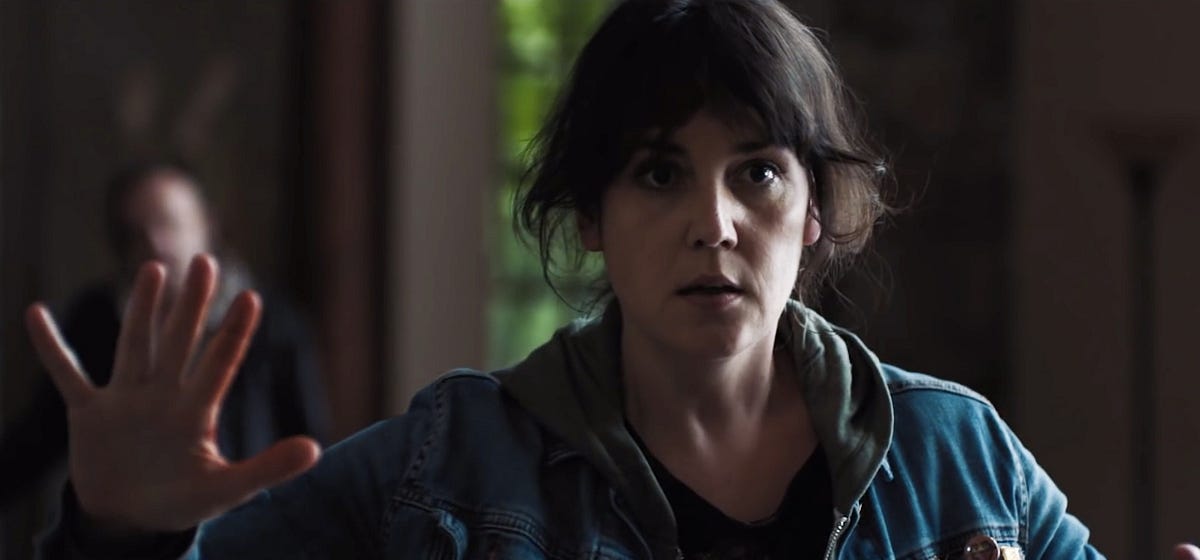SCREEN CAPSULE: I Don’t Feel at Home in This World Anymore. (2017)
No film is better at depicting the immedicable frustration one can feel when the whole world seems to lack common decency.

Fitting for an old Morissey song, I Don’t Feel at Home in This World Anymore. is the cumbersome title of Macon Blair’s 2017 directorial debut about Ruth (brilliantly played by Melanie Lynskey), a proper contemporary American hero. She’s depressed, working a cul-de-sac nursing assistant job, and endlessly frustrated with the human condition. From the racist last words of her dying patients, impolite shoppers, book-spoiling strangers in the bar (Blair’s cameo), to persistent dog waste on her front lawn, Ruth sees it all — with a bottle of beer habitually in her hand. When petty burglars break into her home, taking away her laptop, her late grandmother’s good silver and some antidepressants, Ruth decides to direct her accumulated frustration toward finding the perpetrators and retrieving these stolen items.
“The thing that really hurts, you know, is the fucking violation,” Ruth, brutally lonely, explains to her only friend’s infant daughter, expressing the central sentiment of the film. The violation that bothers Ruth is a cumulative lack of empathy, a state of the society we live in today, in America and beyond. In Blair’s movie, such ruthless indifference climaxes when Bendix (Gary Anthony Williams), the detective in charge of her case, dismisses her surprisingly effective efforts to trace and identify the burglar, succumbing to his own personal miseries.
When Ruth shares the news of the crime with Tony (Elijah Wood), the neighbor found guilty of leaving his dog droppings behind, he violently slams his nunchucks, enraged by the indecency of the deed. Tony feels Ruth’s fury just as she feels it, thus providing the necessary validation, and camaraderie, for her experience. The events leading to their encounter paint Ruth’s aloneness as a consequence of a world that either doesn’t recognize or, worse yet, simply doesn’t care to acknowledge her demand for human decency. Tony brings a simple remedy — empathy — joining Ruth on a naïve vigilante crusade with a sole demand “for people to not be assholes.” That’s when this feature descends into pandemonium.
With elements of dark comedy, satire, crime and romance, the film amalgamates genres, rather than entangling them, for a fresh, authentic outcome. The characters are clearly composed, while the ridiculousness is undeniable: excessive vomit, blood and fingers broken by the elderly — none of it lacks, yet the sharp cleverness of the film rarely seems to be lost in the process. Blair uses humor to relieve dramatic tension, but is careful not to turn the whole thing into a spoof. As the DP, Larkin Seiple follows Blair’s genre-bending narrative with great skill, reflecting years of successes in advertising and music videos. Blair’s two younger brothers, Will and Brooke, composed the music, for a perfectly fitting score but without any memorable original tracks.

I Don’t Feel at Home in This World Anymore. explores the difficulties of, as Blair puts it, “chasing after the notion that people could maybe, just maybe, be less of an asshole in their daily life”, without becoming an asshole personally. It shows that, in the end, what matters the most is to treasure those around us who share our values, and to draw positive energy from friendship as the primary antidote to the crisis of human ethics and morale. While the film is about human connection, its front is of a detective story, “but everybody’s sensitive and fairly easily frightened,” as Blair pointed out in an interview with No Film School. Since one doesn’t get to see such a synthesis very often, watching I Don’t Feel at Home in This World Anymore. is a must for all (unless you’re faint of heart).
SCREEN CAPSULE is a film/TV review project of Bes Arnaout, in which she attempts to help mainstream critical consumption of the moving image through non-academic criticism of the formal techniques and the thematic content of all screen-media.
Bes can be reached at bes.arnaout@princeton.edu